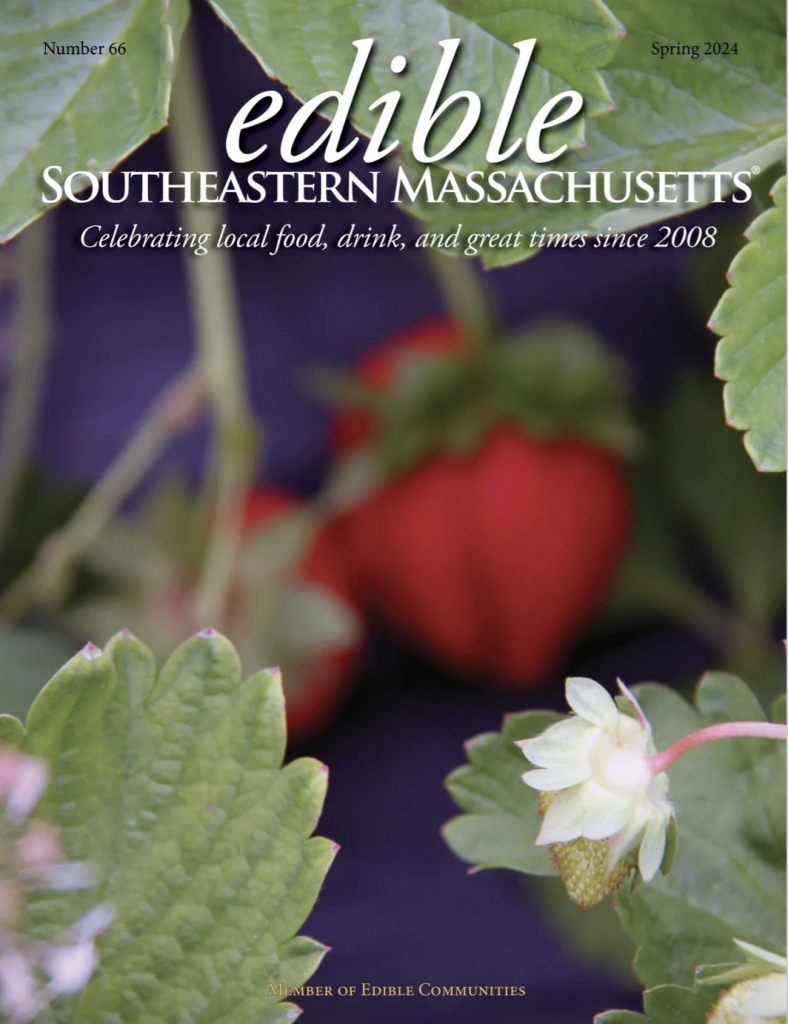by Julia Powers.
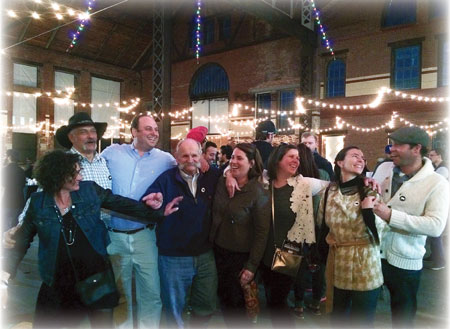
-The Brown Boar Farm Family
For many people, family and food are inexorably linked, with each providing its own special kind of sustenance. Perhaps this powerful pairing is why the food industry is ripe with family businesses, many spanning multiple generations. But, as we all know, family can bring its own set of challenges. For those in the food industry, what is it like to work in a multi-generational family business? Do shared values and family loyalty make for a happier work life? Or does the workplace magnify the petty exasperations experienced by every family? We spoke with five local family businesses–both founders and members of successive generations–to learn about the joys and challenges they face.
Keep It Together
Because of our crazy busy lives, families don’t get to see each other as much as they would like. Working together in a family business solves this problem. In fact, for our panel, staying connected with their loved ones was one of the great joys of working in a multi-generational family business. And, sometimes, it is the driving force behind the business. When Peter Burrows’ wife Regina was being treated for cancer, they had the type of discussions that none of us like to contemplate. As Peter recalls, facing her own mortality, she urged Peter to “find a way to keep the kids together.” As he considered how to do this, he remembered their own childhoods where gardening was an activity that kept the family connected. And, full of questions about his wife’s diagnosis, he considered the sorry state of our nation’s food supply. Peter remembers, “I don’t like the way agriculture was going in this country. Do you want to be a spectator or get out in the field?” Fast forward 17 years, three generations of the Burrows family now work together at Brown Boar Farm, honoring his late wife’s wishes. As his daughter Meaghan points out, “If we didn’t work together we probably wouldn’t see each other as much as we do. It [the family business] really does keep us glued together.” A family business also allows freedom to create an organizational culture that aligns with the family’s values. Peter wanted to be involved in changing the paradigm of our food system, and his family shares that belief. “It’s not just about the meat, it’s about the mission,” explains Meaghan.
Teach Your Children Well
Working together also allows different generations to learn from each other in an organic way. Todd Blount credits his dad with teaching him many valuable lessons, both business and personal, throughout the years they worked together. When Todd’s grandfather died unexpectedly, Todd’s dad had to take over the reins of the company much earlier than anticipated. Todd remembers, “Because Dad was thrust into his role at a young age with the early death of his father, he gave me a lot of responsibility at an early age.” His dad is now largely retired but remains company CEO, and Todd is grateful he was “taught by my dad to take risks. That it is okay to discontinue things and start new things.” At Blount Fine Foods, this willingness to embrace change was evident when, in response to changing customer demands, the company added an extensive array of organic and gluten-free soups and committed to using locally sourced ingredients whenever possible.
In family businesses, the younger generation teaches valuable lessons as well. Before joining St. Ours & Company, Sharon St. Ours worked in biotech engineering. When she finally joined the family business, she brought marketing and compliance skills that greatly benefited St. Ours & Company, especially since traceability and sustainability have become an important aspect of the industry.
Family Pride
Every family cited pride as one of the aspects of a family business that gave them the most joy, although the reasons are varied. But, as Todd Blount elucidated, “Pride in the best sense of the word. Pride of ownership.” The families were proud of weathering the many challenges that come with business ownership including, as Todd noted, “The ability to reinvent. Here’s a business (Blount Foods) with an evolving strategy. We birthed a new company out of an old one.”
Bob Gaspar gets a sense of pride seeing the family name of the package. This pride of ownership is why, Bob says, “You’ll see me on Saturdays going around to supermarkets and making sure they are fully stocked. Your name is on it!” While it is a tremendous responsibility to take over a business built by a previous generation, there is something innately fulfilling about doing so successfully. As Bob points out, “It is satisfying we have survived so many years when it is very rare [for businesses] to go beyond the third generation.” And, regardless of our ages, we all want to make our parents proud. As Todd Blount observes, “When you hear a parent
Work, Work, Work
Many of the families cited hard work as both a positive and negative component of multi-generational family businesses. Since he loves the work, Bob Gaspar says it is “both a challenge and joy. It takes a lot of hours and hard work.” Perhaps because of the weight of the inherited legacy, Todd Blount points out that “like most successful family businesses, being a family member means working twice as hard so no one thinks it was handed to you.” John Pica remembers missing many birthdays, holidays and even the birth of his grandchild because the restaurant was open. When his son was in elementary school and wanted John to take the day off, John replied he couldn’t leave his dad to handle the restaurant alone. After John’s son suggested he call and tell Grandpa that he was sick, John explained he couldn’t lie to his father and miss work. John says he will never forget when his son answered, “My friend Chris says his dad does it all the time!” But that doesn’t fly in a family business.
Can I Count You In?
Family businesses can be heavy with expectations. Will the next generation join or not? Are they well suited for the business? How will the business get passed on? The answers to these questions are as individual as the families themselves. At Blount Fine Foods, Todd believes it is important to “make sure the kids really want to be here.” To that end, the younger generation has to work someplace besides Blount Fine Foods for at least three years and then be hired within the company to work for a non-family member. Peter Burrows considers whether “the next generation is getting the financial or business training they need to be successful.” When thinking of Gaspar’s future, Bob Gaspar emphasized the importance of succession planning and finding trusted professional partners to guide you through the process.
Lasting Legacy
Any business owner can recount the many responsibilities of running the show. But members of multi-generational family businesses also feel the weight of family legacy. Todd Blount sums it up well, “You have the classic business responsibilities, plus who wants to be the generation that closes a building, sells a business line or, God forbid, closes the whole company.” Feeling gratitude to the generations that started and first built these businesses is a responsibility the succeeding generations take very seriously.
Working with several generations of your family both mirrors and magnifies the joys and challenges of family life. But one thing is clear: while these families take their role as stewards of their family businesses seriously, they are also clear that, at the end of the day, family itself is the most important. As Sharon St. Ours says, “There is a balance between the business and the family side. It comes down to the family is always more important.”
Our featured family-owned local businesses
Blount Fine Food
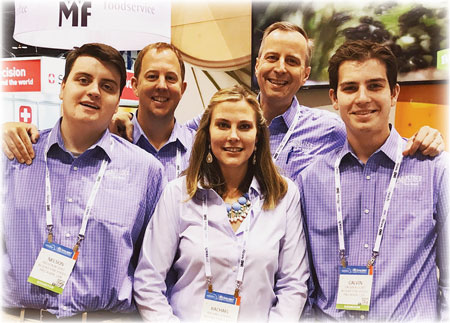
-Blount Fine Foods manufactures fresh and frozen premium soups as well as side dishes and entrees for foodservice and retail outlets. Todd Blount (second from right) is the president and a fifth-generation family member.
630 Currant Road Fall River, MA 02720
(774) 888-1300
www.BlountFineFoods.com
Brown Boar Farm

-Brown Boar Farm (above) raises heritage breed pork and sells their products at select retail outlets, restaurants, and farmers’ markets throughout the South Shore. We spoke to founder Peter Burrows (fourth from left) and his daughter, Meaghan Swetish (third from right), who coordinates sales and farmers’ markets. His other daughter Sarah (fourth from right) and grandson Aiden (not pictured, he was under 21 and legally not allowed to join the festivities pictured above) run the farm.
543 Lamb Hill Road East Wells, VT 05774
(802) 325-2461
www.BrownBoarFarm.com
Gaspar’s Sausage Company
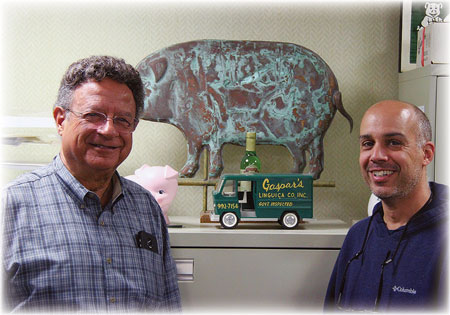
-Gaspar’s Sausage Company makes Portuguese smoked sausage including chourico and linguica that is sold throughout the US. Bob Gaspar (left) is a third generation family member. Fourth and fifth generation family members also work at the company.
384 Faunce Corner Road North Dartmouth, MA 02747
(800) 542-2038
www.GasparsSausage.com
St. Ours & Company
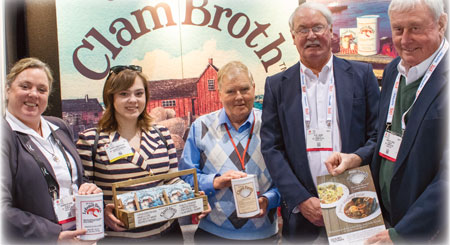
-St. Ours & Company (above), well known for its dehydrated clam broth used by foodservice, restaurants, and home cooks to make our region’s famous clam chowder. Th e company also make other dehydrated fish stocks. We spoke with Sharon St. Ours (left), who is the daughter of the company’s founder, Fred (right).
1571 Commercial Street East Weymouth, MA 02189
(781) 331-8520
www.SaintOurs.com
The Venetian Restaurant
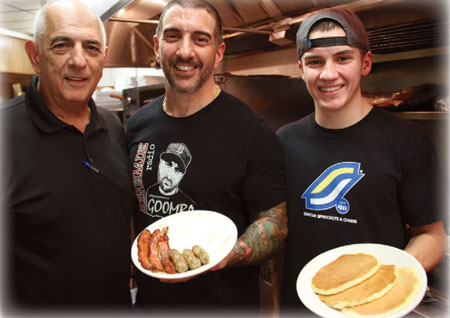
-The Venetian Restaurant a beloved Weymouth restaurant serving fine Italian food favorites for four generations. John Pica, Jr. (left) is a third generation family member and his son John III (middle) also works at the restaurant. Grandson Dom (right) too!
909 Broad Street East Weymouth, MA 02189
(781) 337-4363
www.VenetianRestaurant.com
Julia Powers (an eSS&SC writer for eight years) has been thrilled to witness the continued transformation of our local food culture. She has gained a deep respect and admiration for the farmers, fishers, and artisan producers whose hard work is helping transform our broken food system.





